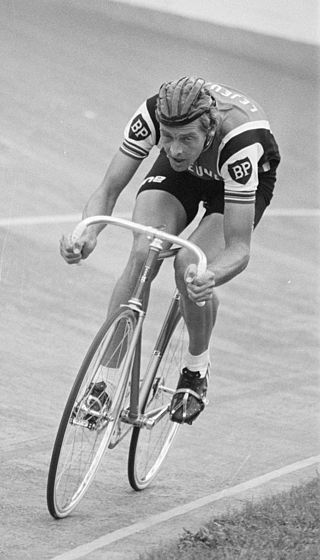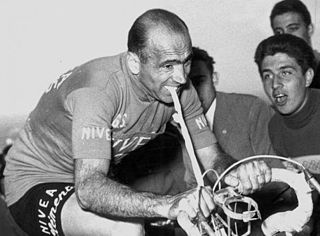
Chateau d'Ax was an Italian professional cycling team that existed from 1983 to 1993, when it was succeeded by Team Polti. Among its various sponsors was Chateau d'Ax, an Italian furniture manufacturer.
Malvor–Bottecchia was an Italian professional cycling team that was active between 1978 and 1990.

Televizier was a Dutch professional cycling team that existed in part from 1961 to 1967. It was sponsored by Dutch television listings magazine Televizier.
DAF Trucks was a Belgian professional cycling team that existed from 1979 to 1983. Its main sponsor was Dutch truck manufacturing company DAF Trucks.

Fagor was a French professional cycling team that existed from 1985 to 1989. Its main sponsor was Spanish domestic and commercial appliance manufacturer Fagor.

La Redoute was a French professional cycling team that existed from 1979 to 1985. Its main sponsor was French mail order company La Redoute, with French bicycle manufacturer Motobécane a co-sponsor between 1979 and 1983.
IJsboerke was a Belgian professional cycling team that existed from 1973 to 1982. Its main sponsor from 1973 to 1980 was Belgian ice cream manufacturer IJsboerke. In 1981 and 1982, its main sponsor was juice drink brand Capri-Sun. Walter Godefroot won the 1978 Tour of Flanders with the team.

Lejeune–BP was a French professional cycling team that existed from 1976 to 1978. Its sponsors were Cycles Lejeune and BP. They are recorded as having 11 UCI wins.
Fiat was a French professional cycling team that existed in 1978 and 1979. It was sponsored by Fiat Automobiles.
Cilo–Aufina was a Swiss professional cycling team that existed from 1978 to 1986. Its main sponsor was Swiss bicycle manufacturer Cilo.
Europ Decor was a Belgian professional cycling team that existed from 1982 to 1984. It participated in the 1984 Tour de France; Frank Hoste won the points classification and three stages, and Alfons De Wolf won a stage.
Vermeer Thijs was a Belgian professional cycling team that existed from 1978 to 1982. It was the successor to the Maes Pils–Mini-Flat team.

Magniflex was an Italian professional cycling team that existed from 1973 to 1981, and in 1986 and 1987. Its main sponsor was Italian mattress manufacturer Magniflex. The team's major victory was Pierino Gavazzi's win of the 1980 Milan–San Remo.

Maino was an Italian professional cycling team that existed from 1912 to 1936. Riders of the team won four editions of the Giro d'Italia. It was sponsored by Italian bicycle and motorcycle manufacturer Maino.

Nivea–Fuchs was an Italian professional cycling team that existed from 1954 to 1956. The team was formed when the Ganna team told its leader, Fiorenzo Magni, that it would not be able to continue and he gained the backing of the German cosmetics company Nivea to be the main sponsor of a new team. It was the first non-bicycle industry company team sponsor. Magni won the general classification of the 1955 Giro d'Italia with the team.

Cynar was an Italian professional cycling team that existed from 1963 to 1965. Its main sponsor was Italian liqueur Cynar.
Gloria was an Italian professional cycling team that existed in part between 1927 and 1943. Its main sponsor was Italian bicycle manufacturer Gloria. Francesco Camusso won the general classification of the 1931 Giro d'Italia with the team.
The 1980 Giro di Lombardia was the 74th edition of the Giro di Lombardia cycle race and was held on 18 October 1980. The race started in Milan and finished in Como. The race was won by Alfons De Wolf of the Boule d'Or team.

Famcucine–Campagnolo was an Italian professional cycling team that existed from 1980 to 1982. Its main sponsors were kitchen manufacturer Famcucine and bicycle part manufacturer Campagnolo. Francesco Moser rode for the team in 1981 and 1982.

Fangio, later known as AD Renting and Tulip Computers, was a Belgian professional cycling team that existed from 1975 to 1992.











